 As a girl, I was stuck on the sideline, watching boy’s basketball games, hoping that the ball would roll out of bounds so I could throw it back into play. I never fathomed girls would be allowed on center court one day.
As a girl, I was stuck on the sideline, watching boy’s basketball games, hoping that the ball would roll out of bounds so I could throw it back into play. I never fathomed girls would be allowed on center court one day.
50 years ago on June 23, 1972, Title IX passed. The federal civil rights law prohibited sex-based discrimination in any educational institution that received federal funding.
It opened doors to places I never knew existed.
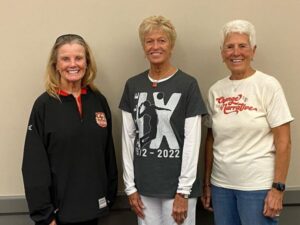
Pillars of ISU Melinda Fischer, Linda Herman, Jill Hutchison
Illinois State University's legendary coaches, Linda Herman (30 plus years as esteemed volleyball coach and administrator) and Jill Hutchison (28 years at the helm of women’s basketball and also a successful international level coach) among others, played a major role in Title IX’s passage and assured its implementation for female athletes.
This June 25, 2022, ISU led the nation again by honoring the pioneers in its Title IX 50th Anniversary Celebration.
In 1976, I was one of the first females to be awarded an athletic scholarship to ISU. Back then, I didn’t even know what a scholarship was. No one realized the profound impact Title IX would have on our lives.
Today young female athletes grow up dreaming of being recruited and receiving athletic scholarships and all its perks just like their male counterparts.
This slideshow requires JavaScript.
During my visit back to the ISU campus for the first time in decades, I was blown away by the accommodations for female Redbird athletes including the opportunity to prepare in the state of the art Jill Hutchison Women’s Basketball Locker Room and play in Redbird Arena, 10, 200 seat capacity.
Many athletes of the current generation never heard of Title IX nor appreciate how we got here. ISU reminded us of the sacrifices in our journey by honoring the pioneers who paved the way
Linda and Jill opened the event by narrating a video of outlining the development of women’s collegiate sport back from the days when women sewed their own uniforms and drove campus station wagons cross country to compete until present times.
We heard firsthand how Title IX shaped the lives of ISU alumni like basketball star Cathy Boswell, 1984 Olympic Gold Medalist, to Jaci McCormick, a Native American player from the Nez Perce Reservation. Jaci went on to co found Rise Above, an organization that uses basketball to promote wellness on reservations.
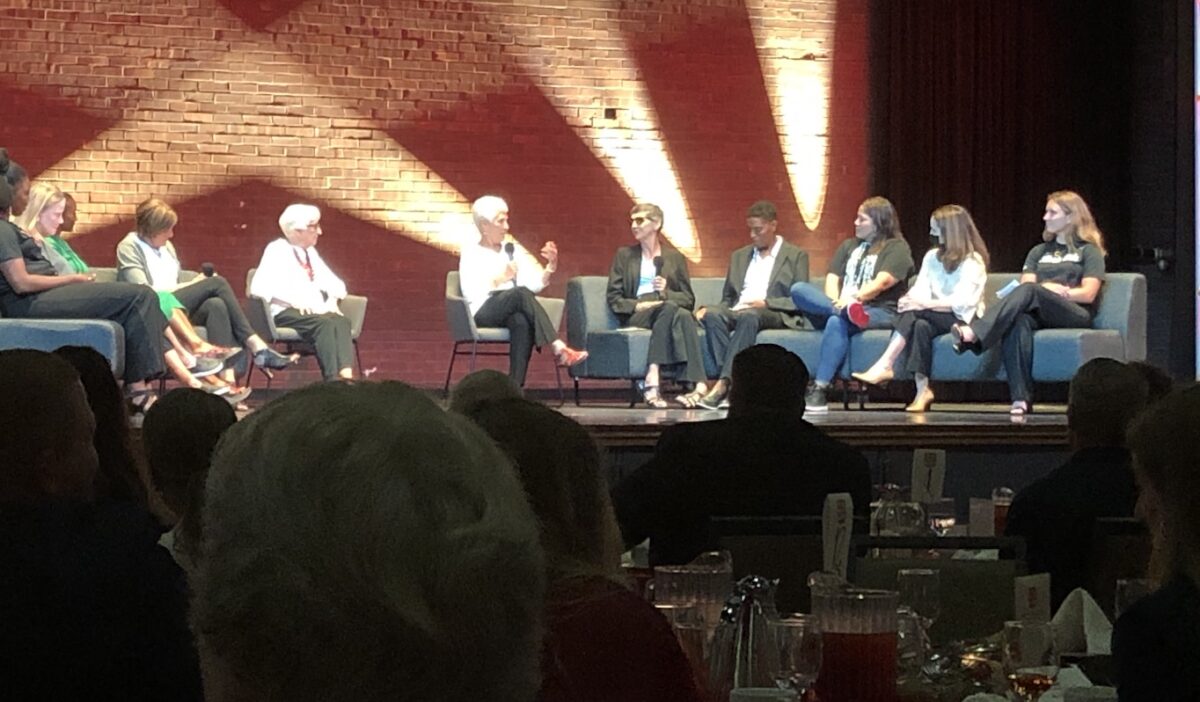
Speakers also included Melinda Fischer, a former 3 sport athlete, basketball and softball coach with the winningest record at ISU and in the Missouri Valley Conference and Angie Taylor, who after a record-setting career in track and field became an illustrious international and collegiate coach. She also developed programs for Nigerian track and field teams.
Still others on the panel shared how they took the foundation and philosophy built at ISU and passed it on as coaches and administrators.
I was humbled and honored to be invited to speak and the share the stage with these legends. Most of you who follow my column know my story.
Basketball took me from ISU, to the women’s first pro league (WBL), to France, Germany and Switzerland. In the late 70s, the Women’s Professional Basketball League (WBL) failed, but we helped give birth to the WNBA in 1996.
After my American pro team went bankrupt, I flew to Paris as one of the 1st American women in European Basketball League, playing first in France and then in Germany.
When my player’s career ended instantly in a car accident abroad, I became a teacher and coach at international schools. For the next 3 decades I served as an ambassador of the game in Europe, guiding athletes from around the globe, first in France, then in Switzerland.
“No person in the United States shall,
on the basis of sex, be excluded from participation in,
be denied the benefits of, or be subjected
to discrimination under any education program
or activity receiving Federal financial assistance.”
Many of the players I coached pursued higher degrees before returning to their homelands to fight for social justice.
When I was a kid, women were banned from the playing fields. I didn’t know any female doctors, lawyers or CEOs.
We fought for the right to play ball and paved the way for our high-flying daughters today.
My own daughter, who I coached in Switzerland, came to USA where she played in a DIII Final 4 for UWSP, studied 11 years and reached her dream to become a pediatrician.
Many of our present day contemporaries never heard our history. I wrote Home Sweet Hardwood, A Title IX Trailblazer Breaks Barriers Through Basketball, to give a voice to the silent generation of women who battled so hard for the rights we have today.
This slideshow requires JavaScript.
Jill and Linda and other dedicated pioneers put together an amazing weekend to celebrate our past, to educate, and to inspire the next generation.
We can’t know who we are if we don’t know where we came from.
We are indebted to women who came before us .
From the sideline to Showtime! Thanks to Title IX, a girl grows up never questioning her right to be all she can be.
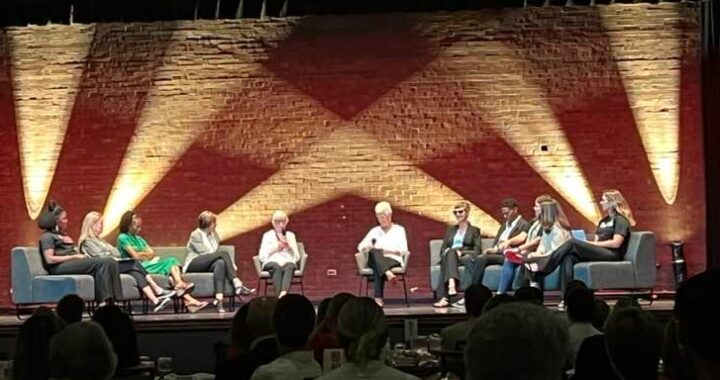
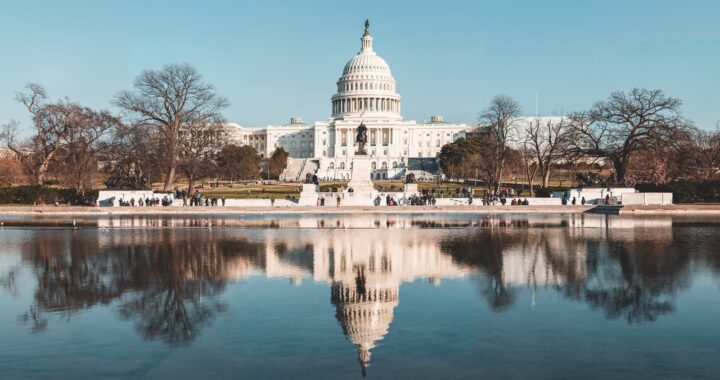
 ur years under the leadership of this madman ended in this deplorable moment in our history, leaving American citizens shocked, appalled, humiliated and terrified. It degraded our image and lowered our status among other countries.
ur years under the leadership of this madman ended in this deplorable moment in our history, leaving American citizens shocked, appalled, humiliated and terrified. It degraded our image and lowered our status among other countries.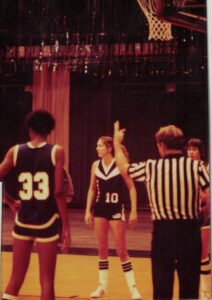 In my twenties I called it home, when I was a player for the professional basketball team, the
In my twenties I called it home, when I was a player for the professional basketball team, the Long after I moved to Europe, DC remained imprinted in my heart - Fort Belvoir, a US Army base where we practiced, the DC Armory, the national guard training arena, where we played our games, and the Capitol Center where we toured. A kaleidoscope of memories collide warm family meals, heated basketball games, cozy jazz clubs in historic Georgetown, and landmarks of American history.
Long after I moved to Europe, DC remained imprinted in my heart - Fort Belvoir, a US Army base where we practiced, the DC Armory, the national guard training arena, where we played our games, and the Capitol Center where we toured. A kaleidoscope of memories collide warm family meals, heated basketball games, cozy jazz clubs in historic Georgetown, and landmarks of American history. Before an entire country can heal, we must begin with one person. Reach out. Get to know someone of another religion, race, culture, ethnicity and learn about their universe. What foods do they eat? What holidays do they celebrate? What language do they speak? What deities do they worship? What fears do they face of living in the USA? How can they be made to feel welcome here?
Before an entire country can heal, we must begin with one person. Reach out. Get to know someone of another religion, race, culture, ethnicity and learn about their universe. What foods do they eat? What holidays do they celebrate? What language do they speak? What deities do they worship? What fears do they face of living in the USA? How can they be made to feel welcome here?



 “Everyone – men and women – can pledge to take a concrete step to help achieve gender parity more quickly and each of us can be a leader within our own spheres of influence and commit to take pragmatic action to help include and advance women.”
“Everyone – men and women – can pledge to take a concrete step to help achieve gender parity more quickly and each of us can be a leader within our own spheres of influence and commit to take pragmatic action to help include and advance women.”


